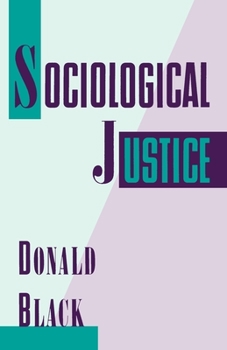Sociological Justice
Select Format
Select Condition 
Book Overview
That discrimination exists in courts of law is beyond dispute. In American murder cases, for instance, studies show that blacks who kill a white are much more likely to receive the death penalty than if they kill a black. Indeed, in Georgia, they are 30 times more likely to be condemned, and in Texas a staggering 90 times more likely. Conversely, in Texas, of 143 whites convicted of killing a black, only one was sentenced to die. But how extensive is discrimination in the courtroom? Is it strictly a matter of racial prejudice, or does it respond to a wide range of social factors?
In Sociological Justice, eminent legal sociologist Donald Black challenges the conventional notion that law is primarily an affair of rules and that discrimination is an aberration. Law, he contends, is a social process in which bias is inherent. Indeed, Black goes well beyond the documented instances of racial discrimination to show how social status (regardless of race), the degree of intimacy (are they family members, friends, or complete strangers?), speech, organization, and numerous other factors all greatly influence whether a complaint will be filed in court, who will win, and what the punishment or other remedy will be. Moreover, he extends his analysis to include not only the litigants, but also the lawyers, the jurors, and the judge, describing how their social characteristics can also influence a case.
Sociological Justice introduces a new field of legal scholarship that will have important consequences for the future of law: the sociology of the case. Black discusses how lawyers can use the sociology of the case to improve their practice and, for those interested in reform, he suggests ways to minimize bias in the courtroom. Beyond this, Black demonstrates that modern jurisprudence, with its assumption that like cases will be treated in like fashion, is out of touch with reality. He urges the adoption of a new sociological jurisprudence, with a new morality of law, that explicitly addresses the social relativity of justice. A major contribution to legal scholarship, this thought-provoking volume is essential reading for anyone interested in law and justice in modern society.
In Sociological Justice, eminent legal sociologist Donald Black challenges the conventional notion that law is primarily an affair of rules and that discrimination is an aberration. Law, he contends, is a social process in which bias is inherent. Indeed, Black goes well beyond the documented instances of racial discrimination to show how social status (regardless of race), the degree of intimacy (are they family members, friends, or complete strangers?), speech, organization, and numerous other factors all greatly influence whether a complaint will be filed in court, who will win, and what the punishment or other remedy will be. Moreover, he extends his analysis to include not only the litigants, but also the lawyers, the jurors, and the judge, describing how their social characteristics can also influence a case.
Sociological Justice introduces a new field of legal scholarship that will have important consequences for the future of law: the sociology of the case. Black discusses how lawyers can use the sociology of the case to improve their practice and, for those interested in reform, he suggests ways to minimize bias in the courtroom. Beyond this, Black demonstrates that modern jurisprudence, with its assumption that like cases will be treated in like fashion, is out of touch with reality. He urges the adoption of a new sociological jurisprudence, with a new morality of law, that explicitly addresses the social relativity of justice. A major contribution to legal scholarship, this thought-provoking volume is essential reading for anyone interested in law and justice in modern society.
Format:Paperback
Language:English
ISBN:0195085582
ISBN13:9780195085587
Release Date:October 1993
Publisher:Oxford University Press
Length:190 Pages
Weight:0.55 lbs.
Dimensions:0.7" x 5.5" x 8.2"
Customer Reviews
1 rating
Know a lawyer? Gift them this!
Published by Thriftbooks.com User , 24 years ago
Black's contributions here should alter the way practitioners understand legal processes and outcomes. Any lawyer, particularly those in trial law, should study this book!





